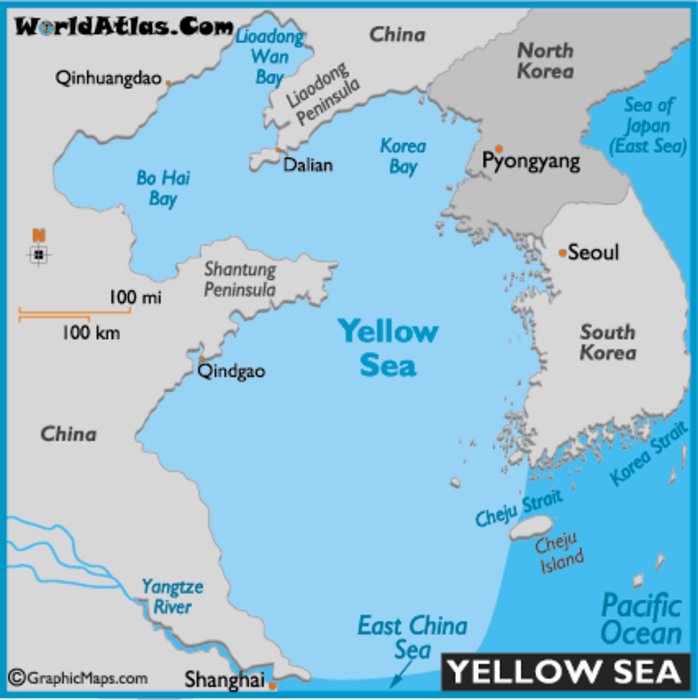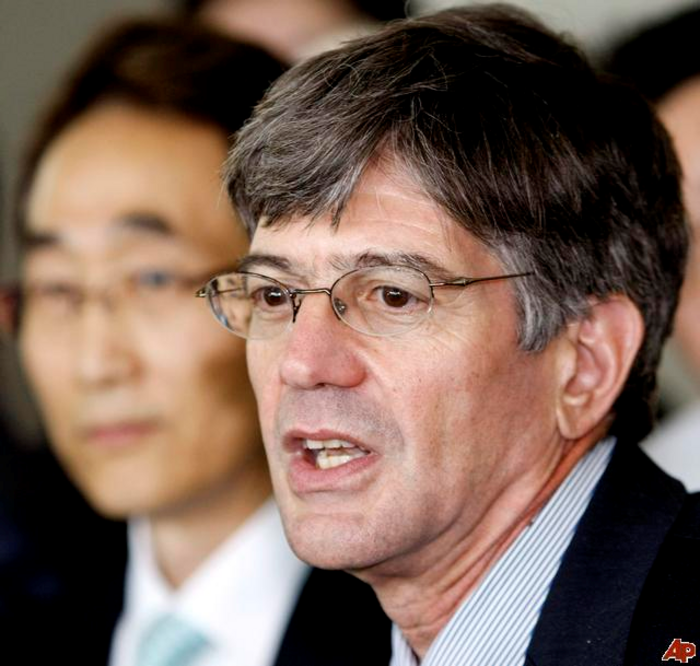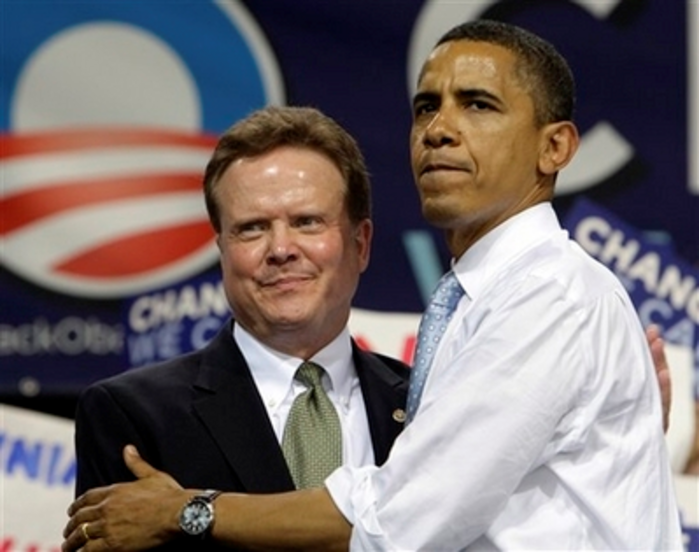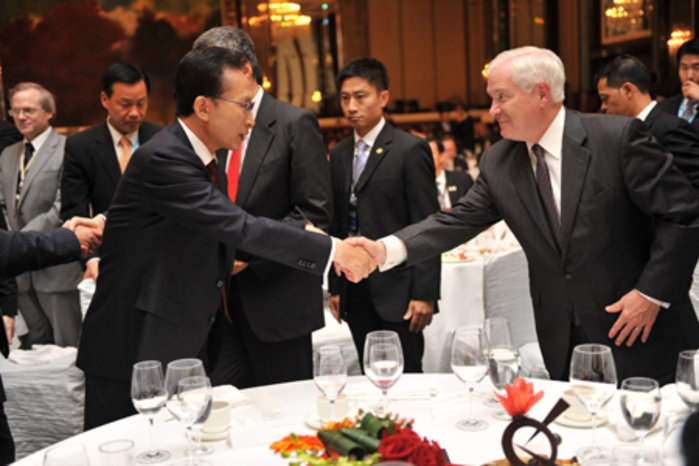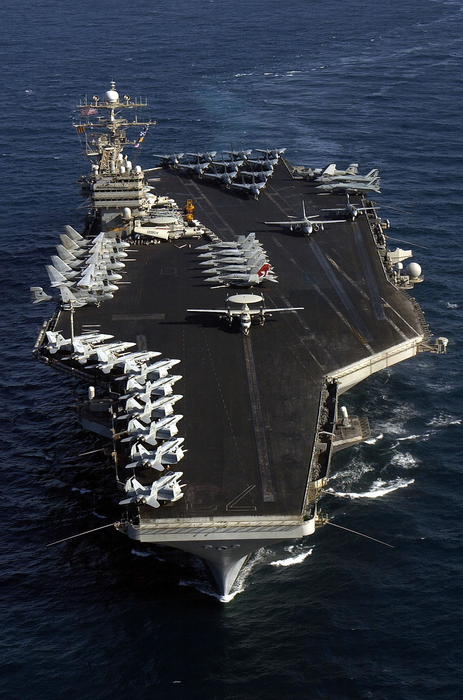The New Face of U.S.-China Relations: “Strategic Reassurance” or Old-Fashioned Rollback?
Peter Lee
The Obama administration took office in 2009 determined to move beyond might-makes-right-makes-might unilateralism of the Bush years, and reassert America’s global influence as the most principled and powerful guarantor of rule-based multilateralism.
With respect to China, this approach was presented as a doctrine of “strategic reassurance”.
However, the policy has not yielded the systemic breakthroughs that the Obama administration hoped to achieve on climate change, non-proliferation, Middle East security, still less on U.S.-China relations.
Instead, increasingly acrimonious exchanges between Beijing and Washington reveal the contradictions inherent in attempting to shoehorn an authoritarian, mercantilist, and suspicious nation into a refurbished world system that ostensibly promotes democracy, open markets, multilateralism, while forcefully advancing American interests.
Now the Obama administration seems to have accepted a world of lowered expectations and strives for the more achievable goal of advancing U.S. power at China’s expense. Friction with China has emerged as a regular feature of U.S. diplomacy—a means to score points in the game of international diplomacy at the expense of an unpopular, uncooperative, and, at least for the moment, diplomatically and militarily weaker regime. Indeed, U.S. China policy today looks a lot like good old-fashioned rollback, isolating China instead of incorporating it into a win-win multi-polar system.
The Western press, distracted by individual issues such as Iran sanctions, Google, and the Cheonan sinking, seems oblivious to the fact that the U.S.-China relationship has lurched into zero-sum territory and relations are in the deep freeze, largely as the result of the willingness of the Obama administration to confront China in pursuit of its agenda. The Chinese media, on the other hand, talks about nothing else.
Observers who believe that China will yield to U.S. pressure as long as its access to world markets is assured are ignoring unmistakable signs that Beijing has decided that, while its economic interests are vital, it must be prepared to downplay short-term economic gain in order to ensure its geopolitical position and national future.
Even in its inception, U.S. demands for “strategic reassurance” were inherently unequal, framed as something that China had to provide up front before the U.S. would reciprocate. Deputy Secretary of State James Steinberg described the doctrine at a Center for a New American Security conference on China in September 2009. The onus for reassurance was put on China in a way that Beijing undoubtedly found grating. (1)
|
U.S. Deputy Secretary of State James Steinberg with Lee Myung-bak |
Strategic reassurance rests on a core, if tacit, bargain. Just as we and our allies must make clear that we are prepared to welcome China’s “arrival”, as you all have so nicely put it, as a prosperous and successful power, China must reassure the rest of the world that its development and growing global role will not come at the expense of security and well-being of others. Bolstering that bargain must be a priority in the U.S.-China relationship. And strategic reassurance must find ways to highlight and reinforce the areas of common interest, while addressing the sources of mistrust directly, whether they be political, military or economic.
Steinberg proceeded to list five areas of “impressive” cooperation: reviving the global economy, denuclearizing North Korea, dealing with Iran’s nuclear program, mitigating climate change, and anti-terrorism and anti-piracy.
In retrospect, it is clear that in only two areas–the global economy and anti-terrorism/piracy–do the U.S. and China share a genuine identity of interests, while with respect to North Korea, Iran and climate change, among other issues, U.S. and Chinese positions remain fundamentally at odds. And in the key area of the global economy, agreement is by no means absolute.
While appreciating the massive Chinese domestic stimulus program (and the equally massive Chinese purchases of U.S. sovereign debt), U.S. plans for the new economic order clearly include a stronger Chinese currency—a situation that Mr. Steinberg alluded to when he described the three “continued areas of mistrust and disagreement”: China’s military expansion, global resource competition, and the economic relationship.
Indeed, in mid-2010, a bleak but accurate gloss on “strategic reassurance” might be that the only area of genuine mutual reassurance concerns China’s willingness to sail around the Horn of Africa in a cautious and responsible manner in search of pirates.
The aggravated US-China relationship is compounded by the Obama administration’s difficulty in making compromises.
At first, the administration’s initiatives looked promising. They made no easy accommodation to habitual U.S. claims to national exceptionalism, and even had some international appeal.
Indeed, they were designed to repudiate the arrogant American me-firstism that had seen the U.S. turn its back on the Kyoto climate treaty, the Comprehensive Test Ban Treaty, the International Criminal Court, and the Law of the Sea Treaty. In short, rather than deploying the rhetoric of national interest, the Obama administration presented itself as a promoter of global norms—and sought to impose those norms on China.
Yet the full brunt of U.S. intentions often only become clear in the foreign policy-making fine print, such as the somewhat obscure speeches of U.S. deputy secretaries. As Steinberg put matters with respect to China:
Now, strategic reassurance does not only apply to the relationship between China and the United States. Our partners, particularly in Asia, must have the same certainty that China’s expanding role will not come at the expense of their interests. And this not only requires that the United States bolster its own bilateral relationships, especially with key allies like Japan, South Korea and Australia, but also that we lead in updating and strengthening the regional and international institutions that shape the context in which China’s development occurs, so that change is constructive rather than destabilizing.
…
When it comes to the international system, we must ensure that new powers like China – and there are others as well, of course – can take their rightful place at the table without generating fear or mistrust. … As we pursue these policies, we will be open to China’s growing role, but we will also be looking for signs and signals of reassurance from China. If China is going to take its rightful place, it must make those signals clear.
So, when U.S. initiatives collided with Chinese interests, there was no graceful way to negotiate between Obama universalism and Chinese particularism or, as it is usually framed in the Western press, U.S. principle vs. Chinese selfishness. The situation has not been helped by the fact that many of the Obama administration’s grand strategic initiatives have fizzled in practice (or in the case of something like economically crippling Iran through sanctions, the outcome may be years in the future).
Complex Rubik’s cube diplomacy involving interlocking initiatives and delicate sequencing on much tougher Iran sanctions, climate change, and nuclear non-proliferation have yielded few breakthroughs. The reasons are numerous, but in each case, China is part of the story. China has challenged the U.S. on a number of these issues. For example, Beijing earned the Obama administration’s ire for its high-profile role in opposing U.S. initiatives in the Copenhagen climate debacle and as a result of its hard bargaining on UN sanctions against Iran.
Partly as a result of Chinese resistance, the climate and NPT treaties and Iran sanctions have, after immense expenditures of prestige and energy by the United States, degenerated into little more than unproductive can-kicking down the road of futile multilateral initiatives. In short, strategic reassurance is not forthcoming in areas of potential cooperation, a situation that the Obama administration blames on China, and not on any shortcomings of its own policies.
Frictions, on the other hand, are persistent and apparently structural. It appears that, in response, the Obama administration has chosen to interpret “strategic reassurance” as the simple and emotionally satisfying strategy of rollback—attacking Chinese interests instead of trying to accommodate them.
From the Chinese perspective, the Obama administration’s China policy increasingly looks, walks, and quacks like containment. Apparently, the United States prefers a different term: “preempting China’s monopoly status”.
On his blog, the Washington Note, foreign policy insider Steve Clemons reported on a conversation he had in early June with senior administration officials involved in the international realm.
One of the most interesting comments made to a question I posed probing the administration’s strategy in Asia, was “Steve, don’t watch the hand!”
What this person was saying was ‘don’t get lost in everything going on at the surface’ in US-China relations or US-Japan relations, but rather look at the other many bits and pieces of America’s engagement in the Asia Pacific that are enhancing US leverage and generating a greater sense among Pacific Rim countries that America is there, engaged, and preempting China from enjoying monopoly status. (2)
Either by accident or design, U.S. public diplomacy campaigns involving climate change, nuclear proliferation, Internet freedom, Iran, and the Cheonan sinking, while yielding few concrete gains, have succeeded in one key respect. They have placed China at a geopolitical disadvantage, forcing it to line up with pariahs or near pariahs like Iran, Burma, and North Korea in opposition to the Western democracies, Japan, and South Korea.
The antagonistic US-China relationship shows signs of becoming institutionalized, especially with the Obama administration’s efforts to establish a solid strategic, legal, and diplomatic foundation for sustained and successful third-country sanctions on the issue of Iran, with the EU and Japan ready as always to lend a hand. The administration’s overwhelming desire to isolate Iran virtually assures a confrontational posture against China.
Even as the UN resolution on the fourth round of Iran sanctions wound its way uncertainly through the Security Council, it was an open secret that China would water it down. The U.S.-proposed solution was follow-on national sanctions that, if not “crippling” as desired by Israel, would hit Iran where it hurt–in the energy sector. The perceived flaw to that solution would be that China would honor the UN resolution, impose no follow-on national sanctions, and scoop up Iran contracts while the U.S. and Europe stood on the sidelines.
U.S. national and EU sanctions are useless if all they do is drive Iran–and its energy investments, petroleum products, and import/export and financial dealings–further into China’s arms, as Glenn Kessler reported for the Washington Post:
U.S. and European officials acknowledge that the administration’s gambit faces uncertainties.
China, for instance, could swoop into Iran to replace Western investors. “China is the elephant in the room,” one diplomat said, but the hope is that China will face political pressure not to appear to profit from an international pullout. Officials also say China cannot replicate some of the technologies and products produced in Europe. (3)
Both Russia and China have insisted that, in return for their support of the UN resolution, they received assurances that follow-on national sanctions by the U.S. and Europe would not damage their energy and economic interests.
However, the obsessively forward-thinking Obama administration would certainly have a plan for addressing the underlying weakness of a massive geostrategic effort that has consumed the energies of the U.S. administration for the last six months.
Perhaps the Obama administration gave Russia and China the desired assurances with the caveat (perhaps implied or unspoken) that, if Iran’s behavior didn’t change, then promises to lay off Russian and Chinese interests would have to be honored, as they say, “in the breach”.
The enabling U.S. legislation on Iran sanctions–H.R. 2194, the Comprehensive Iran Sanctions, Accountability, and Divestment Act of 2010–was signed by Obama in early July and provides ample justification for imposing third country sanctions, whether in sorrow or in anger: (4)
The proposed bill, announced in a joint statement by Representative Howard Berman (D-Calif.) and Senator Christopher Dodd (D-Conn.), would bar non-U.S. financial institutions dealing with Iran’s Revolutionary Guard or targeted Iranian banks from also doing business with the U.S. banking sector. The bill would also penalize firms selling gasoline to Iran through restrictions on their U.S. bank transactions, property transfers and foreign exchange in the United States.
As one analyst observed, “The act presents foreign banks doing business with blacklisted Iranian entities a stark choice — cease your activities or be denied critical access to America’s financial system,” an outline of the bill states, adding that it would address problematic moves taken by international branches of U.S. financial institutions. (5)
President Obama made a show of asking for explicit waivers for “cooperating countries”, understood to be Russia and China, in return for their support on the UN resolution, as a demonstration of good faith. He didn’t get the blanket waivers, but he is perhaps not unhappy that he didn’t. He will be able to grant one-year exemptions for individual corporations, albeit with a “name and shame” requirement to put the recipients on the public record.
Therefore, if China exploits Western and Japanese sanctions to entrench itself in Iran’s energy sector or is excessively dilatory in supporting the initiatives of the Obama administration, financial sanctions can be deployed against its banks, as they were earlier with respect to North Korea in the famous case of the 2005 sanction of Banco Delta Asia, a small bank in the Chinese territory of Macao.
The Obama administration’s carefully-constructed legal and diplomatic edifice of third-country sanctions gives the United States a weapon that it can wield against China, not only on Iran, but also to advance US interests in the myriad other areas of friction that bedevil the relationship. The other key area of friction between the United States and China today is the Korean peninsula.
In a development that China affects to find increasingly suspicious, U.S. exchanges with China in Asia have grown progressively more confrontational, thereby playing to America’s primary strength—its overwhelming military superiority while highlighting a key Chinese vulnerability—regional fears (albeit voiced mostly by Japan and more recently South Korea) concerning the geopolitical ambitions of its burgeoning military.
In particular, it appears that the temptation to exploit China’s geopolitical vulnerabilities—and take advantage of South Korea President Lee Myung-bak’s enthusiasm for using U.S. support to challenge Chinese hegemony in Northeast Asia—were irresistible to the Obama administration.
The result is a destabilization of the Korean peninsula that has, by U.S. design, achieved the exact opposite of reassurance.
Things started to come to a nasty head over the sinking of the South Korean corvette Cheonan near North Korean waters on March 26. The way South Korea and the United States have allowed the issue to play out seemed designed to put China in an ugly light.
South Korea turned to the United States and its allies—and passed over China and Russia—to conduct the investigation into the sinking. Then the United States took center stage to endorse the findings, and South Korea’s call for UN action, unequivocally. Secretary of State Clinton visited China to encourage it to support the ROK/US position. To date, China has declined. The United States and South Korea profess to believe that China prefers to protect its feckless and dangerous ally, North Korea, instead of standing with justice, security, the international community, and its key economic partner, South Korea. China’s statements in favor of peace on the peninsula and greater diplomatic efforts by the North and South to settle their differences get no respect.
Senator James Webb, the Democratic Party’s most influential spokesman on Asia in Congress, put it this way, in a Korea Times news article posted on his official website:
Webb said China’s position on the Cheonan incident when it reaches the UNSC will be a barometer of its willingness to cooperate with the international community.
‘It is a good opportunity for the rest of the world to observe and comment on whether China is proceeding in a mature fashion as a member of the international community,’ he said. ‘It’s a test of whether it can participate among the leadership of the world community.’ (6)
|
James Webb with Barack Obama |
The Chinese government may feel that the South Korean/international investigation contains enough evidentiary and procedural shortcomings that it can be safely disregarded. A recent report by the South Korean Board of Audit and Investigation, while calling for the removal of 25 ROK military officers for their failings in responding to the disaster, also highlighted at least two instances of falsification of official records of the incident.
The South Korean military was further embarrassed by the revelation that it had displayed the schematic of the wrong North Korean torpedo when it rolled out its case on May 20.
However, China’s ambivalence on the issue of the Cheonan probably has more to do with the growing suspicion that the U.S. definition of “strategic reassurance” now involves, above all, not just the maintenance but the attempted enhancement of U.S. strategic advantage in China’s backyard.
The Cheonan incident and the U.S. response did not occur in a vacuum. They took place at a time of considerable uncertainty concerning the U.S. forward position in the Pacific. In late 2009/early 2010 the Obama administration was busy ostracizing the Democratic Party of Japan government in Japan, which was attempting to establish a more equal and independent role for Japan within the U.S.-Japan-China triangle. The DPJ government’s unwillingness to accept the U.S. position on a key issue was its campaign promise (recently abandoned) to renegotiate the deal made by the outgoing Liberal Democratic Party to build a new U.S. Marine Air Station at Oura Bay on Okinawa.
At the same time, the conservative government of South Korean president Lee Myung-bak was determinedly burnishing its pro-American credentials by backing away from the independent security policy and “sunshine” engagement of North Korea favored by its two predecessor governments.
The United States decided to reward President Lee–and South Korea’s ambitions as a regional power and security partner, placing it virtually on a par with Japan–by endorsing several moves designed to enhance the nation’s stature. These included supporting South Korea as the host for two prestigious summits: the G-20 confab in November 2010, and the next Nuclear Security Summit–President Obama’s keystone diplomatic initiative–in 2012. Part of the deal apparently included a coordinated response on the Cheonan sinking, extending beyond participation in the investigation and support of its findings to agreement to support a call for UN Security Council action.
The cost of this deepening of the ROK-US security relationship was China’s feeling that the two countries were ganging up on China on matters Northeast Asian. To Beijing, the U.S. clearly showed the cloven hoof by endorsing the UN Security Council as an appropriate venue for the Cheonan sinking. This implied that the United States’ idea of “strategic reassurance” involves good relations only if China repudiates its North Korean ally and acquiesces to sidelining the Six Party Talks—a diplomatic initiative that granted China a central role in regional and global affairs.
It also indicated that the U.S. was promoting a new, destabilizing security paradigm in North Asia—promoting an enhanced role for South Korea while pushing the future of North Korea into the U.S.-friendly UN Security Council at the expense of the Six Party Talks. As the North Korean regime approaches a leadership transition that might plunge it into chaos, Beijing is surely sensitive to the fact that America seems to be sidelining the PRC from the consultations that may decide the future of the Korean peninsula.
These issues received an airing at the Shangri-La Dialogue, a think-tank sponsored confab of defense ministers held annually in Singapore. At the 2010 iteration, held from June 4-6, South Korean President Lee Myung-bak carried his campaign to exploit the geopolitical implications of the sinking of the corvette Cheonan to a major Asian forum. His call for a united anti-North Korea front by the civilized world was overshadowed by a conspicuous spat between U.S. Secretary of Defense Robert Gates and China’s delegation to the conference, led by General Ma Xiaotian.
|
Lee Myung-bak with Robert Gates at the Shangri-La Dialogue |
Secretary Gates dismissed China’s Taiwan arms sales-related anxieties with a condescension that China’s official opinion found infuriating, especially when contrasted with a high-profile tripartite meeting between Gates, Lee Myung-bak, and Japan’s Defence Minister that pledged to “deter further provocation” in the region.
During the conference, it transpired that Secretary Gates was not welcome to visit Beijing. This was construed, perhaps inaccurately, as a further, high-profile expression of Chinese displeasure at Taiwan arms sales. The Taiwan arms sale matter had been thoroughly hashed out earlier in January and had already triggered the tit-for-tat Chinese response: cancellation of scheduled military exchanges and some US-China diplomatic exchanges at the Vice Foreign Minister level.
It is more likely that by June Beijing was sending a message concerning the overall health of the military and political relationship with the U.S.—a message that Secretary Gates was perhaps not ready to share with the Western journalists covering the conference.
In the Q&A subsequent to Secretary Gates’ speech, Chinese Major General Zhu Chenghu, took the U.S. to task for working with Israel to slow walk the investigation on the assault on the Gaza aid flotilla, while demanding full speed ahead on censure of North Korea. Zhu concluded with a remarkably straightforward statement of dissatisfaction: “The Chinese are taking the Americans as a partner, as friends, and Americans take the Chinese as enemies.” (7)
In his official remarks to the forum, General Ma criticized the traditional military mindset of relying on zero-sum alliances that weaken an adversary. He also made the pointed remark, “We should not treat only the symptoms but not the causes, still less try to put out a fire with a hammer.” (8)
This can be construed as a reference to America’s preference for casting all regional problems within a security template simply because military might is America’s last remaining trump card in Asia. Matters have not improved since Singapore.
Previously, mindful of the objections of the Democratic Party’s union base, President Obama had resisted pushing Congress to ratify the South Korea—US Free Trade Agreement. However, the U.S. yielded to South Korean strategic blandishments—President Lee had openly stated that he wanted to stall the ROK-PRC Free Trade Agreement until after the agreement with the U.S. went into effect, so the U.S. could gain the greatest benefits—and President Obama confirmed the pro-ROK/anti-China tilt of his administration by coming out in support of ratification of the South Korea—U.S. Free Trade Agreement. President Obama then used the public forum of the G20 summit in Toronto to pointedly insult President Hu Jintao by accusing China of “wilfull blindness” in refusing to publicly endorse the results of the investigation into the sinking of the Cheonan.
Chinese perceptions of U.S. hypocrisy and hostility were undoubtedly reinforced by the observations that a) no public insults were directed at Russia which has also declined to endorse the Cheonan findings as yet; and b) the U.S. stepped forward to reject a North Korean call for a joint investigation of the Cheonan sinking under the auspices of the UN—an investigation that might reveal additional embarrassing holes in the “compelling” case that the US claimed China was exercising “wilfull blindness” in disregarding.
Criticisms of U.S. China policy in the Chinese media have become less oblique and markedly more strident. Chinese media characterized President Obama’s “wilfull blindness” rebuke as “irresponsible and flippant”.
The next, inevitable area of friction concerns the joint U.S.-ROK naval exercises scheduled for early July in the Yellow Sea between the Korean peninsula and China, which may or may not feature an appearance by the U.S. aircraft carrier George Washington. With good reason, China has chosen to interpret these exercises as a deliberate provocation, whose purpose is not to overawe North Korea; it is to humiliate Beijing by demonstrating that the U.S. fleet can sail the oceans of East Asia in disregard of China’s sensibilities and openly expressed objections.
|
The USS George Washington |
A June 12 People Daily Online editorial entitled, “US Must Restrain Provocative Military Actions” predictably adopted the framing favorable to China, calling for “peace” instead of “provocation” and made it clear that it expects that it is China and not the United States that should be “reassured”:
The United States may believe that since it conducted military drills in the Yellow Sea in the past, it can do that now and in the future. But the United States should understand, with China’s increasing national strength, Chinese nationals will get more sensitive to the provocative actions the U.S. navy takes in a place so close to their home.
No one would allow its competitor with guns in hand to wander in front of their home or keep a close watch staring through their windows, and the Americans would not too.
China does not object to the U.S. navy’s presence in the western Pacific and even shows understanding that some countries in this region still need the U.S. military to provide a sense of security. And no country has the capability to replace the United States in this capacity. But, this does not mean the United States can ignore China’s self-esteem and drive their aircraft carrier straight to the front of China’s doorstep to flex their muscles.
Only when the United States learns to respect the western Pacific countries and adapt to the changes of their politics, economies and, in particular, public opinion, can its authority in this region be recognized. The United States should make people feel that the U.S. military presence in this region is peaceful and necessary, not vice versa.
Furthermore, the United States needs to take into account these countries’ moods if it wants to become a peacemaker, not a troublemaker. Otherwise, the United States will have difficulties in staying in the region for a long time and its interests here will be difficult to effectively protect. (9)
People’s Daily’s international affairs mouthpiece, Global Times, ran an editorial with a similar theme—and wording—under the title “Yellow Sea No Place for US Carrier”:
Many Chinese are tired of the abrupt changes in US posture. The US just stressed the importance of partnership between the two countries at the second Strategic and Economic Dialogue at the end of last month. Now, it looks as if the US could try to incite China with military aggression. (10)
China’s expression of displeasure moved from words to munitions, as China announced its navy would conduct live fire drills in the East China Sea for the duration of the U.S.-ROK maneuvers.
On July 6, Global Times ran a blunt editorial titled, US has to pay for provocation.
The US provocation on the western Pacific is a typical act born out of the Cold War mentality.
This will only further isolate the US in these parts, as no East Asian country would like an outsider to mess up the region, and its neighborhood.
Developments in East Asia over the past 10 years contributed significantly to the economic boom of the United States in the decade before it suffered a setback from its own financial trouble.
As commander in chief, Barack Obama needs to rethink his role in East Asia, as to whether he is squandering the invaluable political heritage left behind by George W. Bush. It will be a tragedy if the US upsets the prevalent situation and turns the clock back on East Asian relations by decades.
Considering the growing economic, diplomatic, political and cultural ties the US has with China, the price the US has to pay for its irresponsible decision will be higher than it can envision now. If the US does not pay for this “adventure” now, it will pay in the future.
These are not the opinions of a strategically reassured–or reassuring–China. These are the words of a threatened regional power that regards U.S. hostility as dangerous and growing.
Scheduling the George Washington to avoid the Yellow Sea in early July is not going to allay Chinese concerns about America’s hostile intentions. By now, suspicion has probably hardened into certainty.
It’s a worrisome reflection on the Obama administration’s China policy that U.S. interactions with Beijing are now apparently driven by frustration, rancor, inertia, and opportunism—and the acrid residue of new American ambitions for regional leadership that China is determined to contest.
Peter Lee is the moving force behind the Asian affairs website China Matters which provides continuing critical updates on China and Asia-Pacific policies. His work frequently appears at Asia Times. He wrote this article for The Asia-Pacific Journal.
Recommended citation: Peter Lee, “The New Face of U.S.-China Relations: ‘Strategic Reassurance’ or Old-Fashioned Rollback?” The Asia-Pacific Journal, 29-1-10, July 19, 2010.
On related subjects see Rick Rozoff, “U.S. Risks Military Clash With China in the Yellow Sea, Global Research, July 16, 2010.



